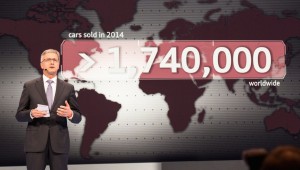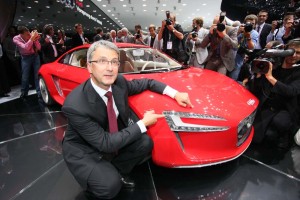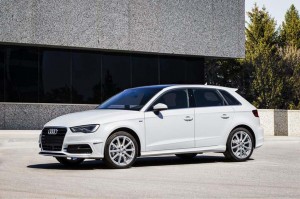
Audi's Board of Management Chairman Rupert Stadler has been fired and remains in jail on charges related to dieselgate.
During any other year, Audi CEO Rupert Stadler would have been a notable presence at the Paris Auto Show where the brand formally introduced to the public this week its new e-tron battery-electric vehicle. But Stadler was a no-show because he remains in a German jail where he has been locked up since June in connection with VW’s diesel emissions scandal.
And even if he eventually beats the charges he now faces, Stadler will have to go looking for a new job. About the same time Audi was revealing the e-tron in Paris, the Volkswagen Group announced that it was terminating Stadler, effective immediately.
In a statement, the company said they had reached “an agreement with Rupert Stadler on the termination,” adding that “Due to his ongoing pretrial detention, he is unable to fulfill his duties as a member of the board of management and wishes to concentrate on his defense.”
A one-time rising star who seemed destined to climb even higher at one of the world’s most powerful automotive manufacturers, the 55-year-old Stadler first got a seat on the Group’s board in 1997 and was named CEO of the semi-autonomous Audi in 2010. His tenure coincided with a massive growth spurt for the luxury brand which has all but caught up to its traditionally dominant German rivals, Mercedes-Benz and BMW.
(Audi’s Stadler wants out of jail during diesel investigation. Click Here for the story.)

German prosecutors arrested Audi CEO Rupert Stadler, and have held him in jail, claiming he could interfere in the investigation if freed.
But Stadler was linked early on to the emissions scandal which, in September 2015, saw Volkswagen accused by the U.S. Environmental Protection Agency of rigging its 2.0-liter diesel engine to illegally pass emissions tests. The automaker subsequently acknowledged the subterfuge and conceded it had also installed a “defeat device” on a bigger diesel engine, as well.
The 2.0-liter powertrain was shared by Audi’s A3 TDI, while the larger engine was widely used in a range of other Audi models.
All told, about 11 million vehicles were rigged, including models sold by the VW and Audi brands, as well as Porsche.
Since the original scheme was revealed, Volkswagen has had to shell out about $30 billion in fines and settlements, as well as on repairs and buybacks.
(Click Here to see why VW was tagged with $1B fine in Germany for diesel-cheating scandal.)
Meanwhile, two former employees have been convicted in U.S. courts, with a number of other managers and executives under indictment but out of reach. That includes former Volkswagen Group CEO Martin Winterkorn, who faces charges of both conspiracy and wire fraud.
Stadler, who once was seen as a potential successor to Winterkorn, was long-rumored to be a target of the investigation, as well. But rather than being indicted in the U.S., he was arrested in June as part of an ongoing probe by German authorities, accused of colluding in the cover-up of the emissions scandal.
Prosecutors have successfully convinced the courts in Germany to keep Stadler locked up until his trial, arguing that he might otherwise attempt to interfere in their investigation.
Since Stadler’s arrest, Audi sales chief Bram Schot has been filling in as acting CEO, but with Tuesday’s announcement, the carmaker is reportedly considering an alternative as permanent CEO, Markus Duesmann, who was recently hired away from rival BMW.
(To see more about Audi CEO Stadler’s arrest as Germany expands diesel emissions probe, Click Here.)
The German probe of the emissions scandal is expected to continue and could yet ensnare other current and former Volkswagen Group executives, including former CEO Winterkorn, according to various reports.

